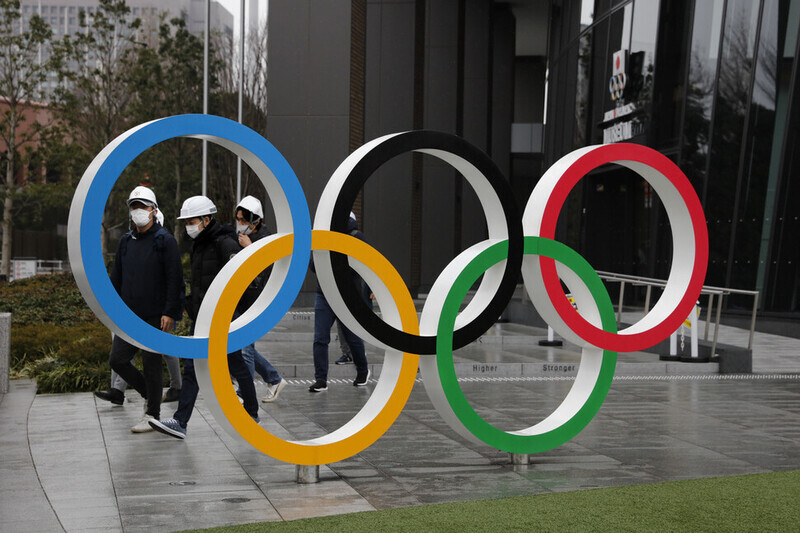hankyoreh
Links to other country sites 다른 나라 사이트 링크
Why is Suga so aggressively pushing Tokyo Olympics despite COVID resurgence?

As the world is battered by another wave of COVID-19, Japanese Prime Minister Suga Yoshihide is aggressively pushing to hold the Tokyo Olympics next summer as planned. Analysts think that Suga’s stance is tied to Japan’s domestic political calendar, including deadlines for electing the prime minister and lawmakers in the lower house.
On Nov. 17, Japanese newspaper the Asahi Shimbun reported that a successful Olympics could give the Suga administration a major boost shortly before the general elections and prime minister election, presuming that Suga holds off on calling a snap election until then.
Following a meeting on Nov. 16 with International Olympic Committee President Thomas Bach, who is currently in Japan, Suga said he intends to move ahead with the Tokyo Olympics, which have been delayed until next July, and promised to keep them safe. Bach and Suga agree that audiences would be allowed to attend sporting events during the Olympic Games.
Suga remains positive about the Tokyo Olympics, seemingly unperturbed by the serious outbreaks of COVID-19 that continue both in Japan and many other countries. The Asahi Shimbun attributed this to “the connection between the Olympics and upcoming events on the political calendar.”
Suga’s term in office expires on Sept. 30, 2021. The Tokyo Olympics is scheduled to run from July 23 to Sept. 5. And the next election in the House of Representatives is supposed to be held by Oct. 21.
If Suga delays the dissolution of the House of Representatives until the end of his own term in office, the success of the Tokyo Olympics could have a direct impact on both those elections.
Since Japan faces a resurgence of COVID-19 with more than a thousand cases reported each day, the snap election is likely to be delayed. Suga has responded to each call for dissolution of the lower house by emphasizing that his priority is on combating COVID-19.
While Japan’s House of Representatives nominally has a four-year term, the prime minister can dissolve it at any time. Suga’s advisors argue that the Olympics would be a huge boon for his administration and that the snap election shouldn’t be called until after the games are over, the Asahi Shimbun reported.
Suga may be firm in his resolve to hold the Olympics, but the biggest factor is likely to be the COVID-19 pandemic. As European cities start to reenter lockdowns, the world wrestling championships, scheduled for December, have been cancelled. The US is reporting more than 100,000 cases of COVID-19 each day.
In apparent recognition of the current mood, the Japanese government will wait until next spring to decide how many people can attend events and whether to let in visitors from other countries.
The Japanese are particularly sensitive to trends in the US. “We’re worried about what US President-elect Joe Biden will think about the Olympics. If large numbers of American athletes stay home, the US broadcaster might take issue with the fee paid for broadcast rights, which could cause problems for the Olympics,” said a source at the Japanese Olympic Committee.
“We’re concerned that athletes who are anxious about COVID-19 might be opposed to holding the Olympics,” another source said.
By Kim So-youn, staff reporter
Please direct comments or questions to [english@hani.co.kr]
Caption: An Olympic logo installed in front of the Japan National Stadium. (AP/Yonhap News)

Editorial・opinion
![[Editorial] Intensifying US-China rivalry means Seoul must address uncertainty with Beijing sooner than later [Editorial] Intensifying US-China rivalry means Seoul must address uncertainty with Beijing sooner than later](https://flexible.img.hani.co.kr/flexible/normal/500/300/imgdb/original/2024/0517/8117159322045222.jpg) [Editorial] Intensifying US-China rivalry means Seoul must address uncertainty with Beijing sooner than later
[Editorial] Intensifying US-China rivalry means Seoul must address uncertainty with Beijing sooner than later![[Column] When ‘fairness’ means hate and violence [Column] When ‘fairness’ means hate and violence](https://flexible.img.hani.co.kr/flexible/normal/500/300/imgdb/original/2024/0516/7417158465908824.jpg) [Column] When ‘fairness’ means hate and violence
[Column] When ‘fairness’ means hate and violence- [Editorial] Yoon must stop abusing authority to shield himself from investigation
- [Column] US troop withdrawal from Korea could be the Acheson Line all over
- [Column] How to win back readers who’ve turned to YouTube for news
- [Column] Welcome to the president’s pity party
- [Editorial] Korea must respond firmly to Japan’s attempt to usurp Line
- [Editorial] Transfers of prosecutors investigating Korea’s first lady send chilling message
- [Column] Will Seoul’s ties with Moscow really recover on their own?
- [Column] Samsung’s ‘lost decade’ and Lee Jae-yong’s mismatched chopsticks
Most viewed articles
- 1Celine Song says she’s gratified global audiences have responded to the kismet of ‘inyeon’
- 2[Editorial] Transfers of prosecutors investigating Korea’s first lady send chilling message
- 3[Exclusive] Unearthed memo suggests Gwangju Uprising missing may have been cremated
- 4For new generation of Chinese artists, discontent is disobedience
- 5[Column] US troop withdrawal from Korea could be the Acheson Line all over
- 6Xi, Putin ‘oppose acts of military intimidation’ against N. Korea by US in joint statement
- 7Highly educated high-earners at risk of being replaced by AI, BOK study says
- 8Japan begins dumping irradiated Fukushima water amid outpouring of concern about vague timeline
- 9USFK sprayed defoliant from 1955 to 1995, new testimony suggests
- 10Four unionists arrested for protesting Fukushima dumping atop King Sejong statue